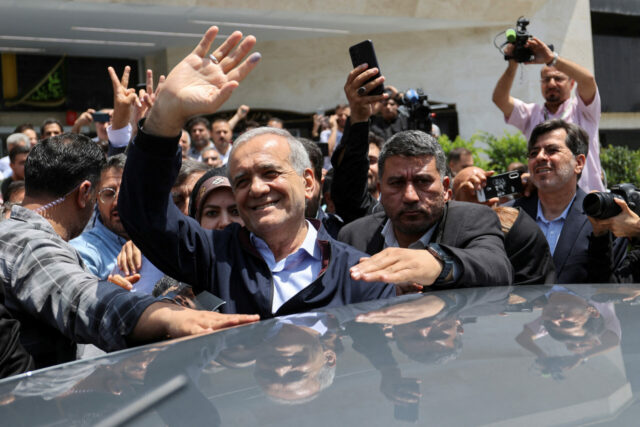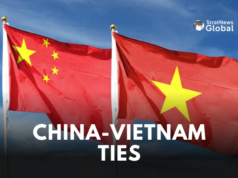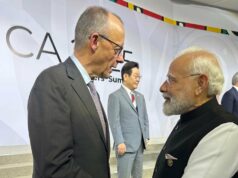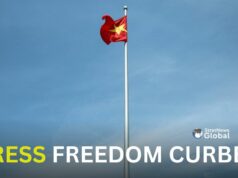In a tight race, Massoud Pezeshkian, a reformist lawmaker will face Iran leader’s protégé, Saeed Jalili on July 5. This will be the second Presidential run off election in Iran’s history.
Pezeshkian, 69, beat his nearly ten years younger opponent, hardline conservative Saeed Jalili for first place in Friday’s first round vote but the two men will now face a run-off election on July 5. The Interior Ministry said neither secured the 50% plus one vote of over 25 million ballots cast required to win outright.
The snap presidential election reported a record low turnout as only 40 per cent of more than 61 million eligible Iranians exercised their franchise.
According to Iranian law, a winner must get more than 50 per cent of all votes cast. If not, the race’s top two candidates will advance to a runoff a week later. There has been only one runoff presidential election in Iran’s history. In 2005, hard-liner Mahmoud Ahmadinejad defeated former President Akbar Hashemi Rafsanjani.
Mohsen Eslami, an election spokesman who announced the result said that of the 24.5 million votes cast, Pezeshkian got 10.4 million while Jalili received 9.4 million. Parliament speaker Mohammad Bagher Qalibaf got 3.3 million. Shiite cleric Mostafa Pourmohammadi had over 206,000 votes.
In an election campaign dominated by hardliners, Iranian presidential hopeful Massoud Pezeshkian stood out as a moderate, backing women’s rights, more social freedoms, cautious detente with the West and economic reform.
Pezeshkian, a cardiac surgeon, lawmaker and former Health Minister was up against candidates who more closely reflect the fiercely anti-Western stance of Supreme Leader Ayatollah Ali Khamenei, the country’s ultimate decision-maker.
And yet the mild-mannered Pezeshkian narrowly won Friday’s vote and made it to the run-off in the election to pick a successor to Ebrahim Raisi, who was killed in a helicopter crash in May.
His chances hinge on attracting votes from supporters of current hardline Parliament Speaker Mohammad Baqer Qalibaf, who finished third in the first round, and encouraging a young disillusioned population eager for change.
Although he advocates reforms, Pezeshkian is faithful to Iran’s theocratic rule.
His views offer a contrast to those of Raisi, a Khamenei protege who tightened enforcement of a law curbing women’s dress and took a tough stance in now-moribund negotiations with major powers to revive a 2015 nuclear deal.
Pezeshkian’s election campaign gained momentum when he was endorsed by reformists, led by former President Mohammad Khatami, and when he appointed former Foreign Minister Mohammad Javad Zarif, a key figure in crafting the nuclear deal, as his foreign policy adviser.
Implicitly referring to the appointment of Zarif, who hardliners accuse of selling out Iran to reach the deal, Khamenei said on Tuesday: “Anyone who is attached to America will not be a good colleague for you”.
In 2018, then-U.S. President Donald Trump ditched the pact and reimposed sanctions on Iran, calling it “a horrible one-sided deal that should have never, ever been made.” His move prompted Tehran to progressively violate the agreement’s nuclear limits.
If Pezeshkian does go on to win, this would hinder Iranian hardliners who are opposed to the revival of the pact.
However, under Iran’s dual system of clerical and republican rule, the power to shape key state policies including foreign and nuclear affairs ultimately rests with Khamenei.
As a result, many voters are sceptical about Pezeshkian’s ability to fulfil his campaign promises.
Pezeshkian, the sole moderate among the six candidates approved by a hardline watchdog body to stand, has pledged to foster a pragmatic foreign policy and ease nuclear tensions with the West. Two hardline subsequently candidates pulled out.
At the same time, Pezeshkian promised in TV debates and interviews not to contest Khamenei’s policies.
As a lawmaker since 2008, Pezeshkian, who is an Azeri ethnic minority and supports the rights of ethnic minorities, has criticised the clerical establishment’s suppression of political and social dissent.
In 2022, Pezeshkian demanded clarification from authorities about the death of Mahsa Amini, a woman who died in custody after she was arrested for allegedly violating a law restricting women’s dress. Her death sparked months of unrest across the country.
During the Iran-Iraq war in 1980s, Pezeshkian, who held roles as both a combatant and a physician, was entrusted the task of deploying medical teams to the front lines.
Power in Iran ultimately lies with Supreme Leader Ayatollah Ali Khamenei, so the result will not herald any major policy shift on Iran’s nuclear programme or its support for militia groups across the Middle East.
But the President runs the government day-to-day and can influence the tone of Iran’s policy.
The election comes at a time of escalating regional tension due to the war between Israel and Iranian allies Hamas in Gaza and Hezbollah in Lebanon, and increased Western pressure on Iran over its fast-advancing nuclear programme.
With Iran’s supreme leader now 85, it is likely that the next president will be closely involved in the process of choosing a successor to Khamenei, insiders and analysts say.
Anti-Western views of Jalili, Iran’s former uncompromising nuclear negotiator, offer a contrast to those of Pezeshkian. Analysts said Jalili’s win would signal the possibility of an even more antagonistic turn in the Islamic Republic’s foreign and domestic policy.
But a victory for Pezeshkian might help ease tensions with the West, improve chances of economic reform, social liberalisation and political pluralism.
Pezeshkian, faithful to Iran’s theocratic rule, is backed by the reformist faction that has largely been sidelined in Iran in recent years.
“We will respect the hijab law, but there should never be any intrusive or inhumane behaviour toward women,” Pezeshkian said after casting his vote.
He was referring to the death of Mahsa Amini, a young Kurdish woman, in 2022 while in morality police custody for allegedly violating the mandatory Islamic dress code.
The unrest sparked by Amini’s death spiralled into the biggest show of opposition to Iran’s clerical rulers in years.
Delhi based journalist pickled in journalism. Have reported from nine world capitals and almost all parts of India. Over the last three decades, I have worked for India’s mainstream English dailies and contributed to All India Radio, Doordarshan and Women’s Feature Service. Also worked for international media including Japan’s leading newspaper, The Asahi Shimbun and done assignments for The Sunday Times, London, The Telegraph, The Guardian and the Canadian Broadcasting Corporation. Worked in the Embassy of France in New Delhi and can speak French to save my life. Write on Diplomacy, Politics and the social sector. Love Nature, heritage, Nature, animals and vintage cars. Enjoy cycling and playing badminton.





